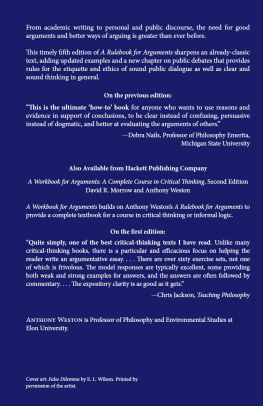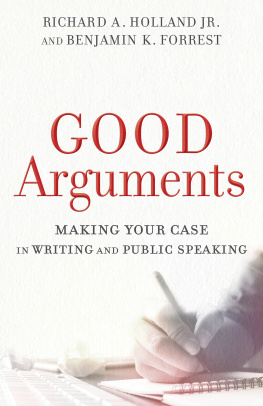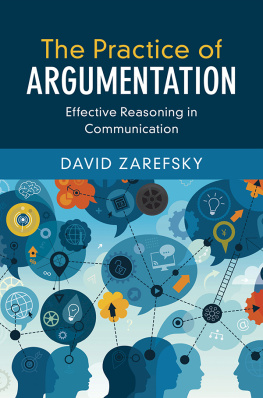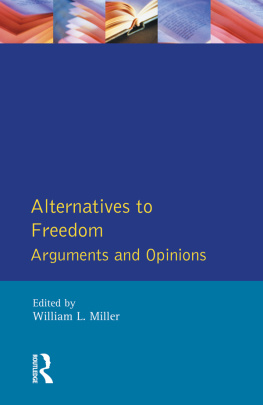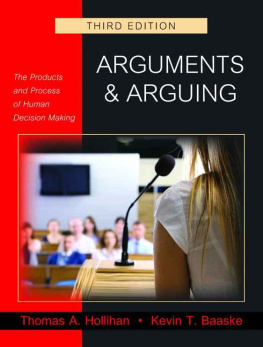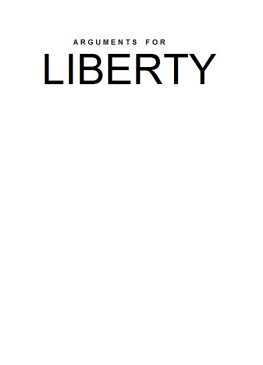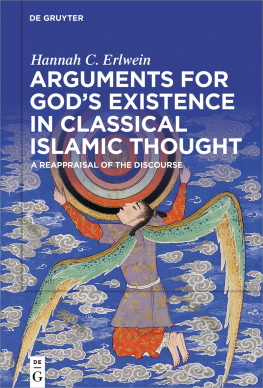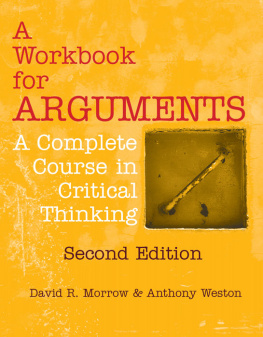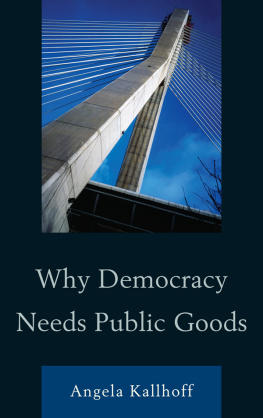Contents
Guide
Pages
A Rulebook for Arguments

Fifth Edition
Anthony Weston
A Rulebook for Arguments
Fifth Edition
Hackett Publishing Company, Inc.
Indianapolis/Cambridge
Copyright 2017 by Hackett Publishing Company, Inc.
All rights reserved
Printed in the United States of America
20 19 18 17 1 2 3 4 5 6 7
For further information, please address
Hackett Publishing Company, Inc.
P.O. Box 44937
Indianapolis, Indiana 46244-0937
www.hackettpublishing.com
Cover art and interior design by Elizabeth L. Wilson
Composition by Integrated Composition Systems
Library of Congress Cataloging-in-Publication Data
Names: Weston, Anthony, 1954 author.
Title: A rulebook for arguments / Anthony Weston.
Description: Fifth edition. | Indianapolis; Cambridge : Hackett Publishing Company, Inc., 2017. | Includes bibliographical references.
Identifiers: LCCN 2017027845 | ISBN 9781624666544 (pbk.) | ISBN 9781624666872 (cloth)
Subjects: LCSH: Reasoning. | Logic. | English languageRhetoric.
Classification: LCC BC177 .W47 2017 | DDC 168dc23
LC record available at https://lccn.loc.gov/2017027845
ePub3 ISBN: 978-1-62466-739-8
Stanley Chodorow, Writing a Successful Research Paper: A Simple Approach.
Gordon Harvey, Writing with Sources: A Guide for Students, Third Edition.
Michael Harvey, The Nuts and Bolts of College Writing, Second Edition.
David R. Morrow and Anthony Weston, A Workbook for Arguments: A Complete Course in Critical Thinking, Second Edition.
David R. Morrow, Giving Reasons: An Extremely Short Introduction to Critical Thinking.
George Pullman, A Rulebook for Decision Making.
George Pullman, Writing Online: Rhetoric for the Digital Age.
{ix}
This book is a brief introduction to the art of making arguments. It sticks to the bare essentials. I have found that students and writers often need just such a list of reminders and rules, not lengthy introductory explanations. This book is therefore organized around specific rules, illustrated and explained soundly but above all briefly. It is not a textbook but a rulebook.
Instructors too, I have found, often wish to assign such a rulebook, a treatment that students can consult and understand on their own and that therefore does not claim too much class time. Here again, it is important to be briefthe point is to help students get on with their actual argumentsbut the rules must be stated with enough substance that an instructor can simply refer a student to Rule 6 or Rule 16 rather than give an entire explanation each time it is needed. Brief but self-sufficientthat is the fine line I have tried to follow.
This rulebook also can be used in a course that gives critical attention to arguments. It will need to be supplemented with exercises and more examples, but many texts are already available that consist largely or wholly of such exercises and examples. Those texts, however, also need to be supplementedwith what this rulebook offers: simple rules for putting good arguments together. We do not want our students to come out of critical thinking courses knowing only how to shoot down (or just at) selected fallacies. Critical thinking can be practiced in a far more constructive spirit. This book is one attempt to suggest how.
{x}
Rulebook continues to find a wide use in a variety of schools, from high school to law school, and in other settings too. The world continues to change as well. In this fifth edition there are several corresponding changes. Most notably, I have added a new final chapter, Public Debates, which repositions a few of the old rules but mostly adds new ones. The state of our public debate at the moment is pretty sorry, and while this surely has many causes, a better understanding of the etiquette and the ethics of good public debate should help. Six short rulesbut what a difference they might make!
Smaller changes include a number of updated examples, drawing on a wider and more contemporary range of sources. Goodbye Einstein, hello Beyonc. This edition is a little fresher, a little tighter, a bit more humorous. Some of the rules have acquired punchy subtitles. This is no time to be timid about the need for good arguments and better ways of arguing, either, so you may find this new edition somewhat edgier as well.
For instructors and students who may be interested, I am happy to add that a companion textbook to A Rulebook for Arguments is now available. David Morrow and I have written it ourselves: A Workbook for Arguments. Workbook includes the entire Rulebook, but between each section of this brief guide, Workbook interpolates further explanations and extensive examples and exercises, with a thorough selection of sample answers as well. Many thanks to Professor Morrow for convincing me and Hackett Publishing Company of the need for and appeal of such a textbook, and then doing the lions share of the work on it, carrying it now through two editions (first edition 2013; second edition 2016). Davids insights and suggestions have helped shape this new edition of Rulebook as well.
Among related changes is that a few of the more challenging examples and themes in previous editions of Rulebook, most notably philosopher David Humes challenges to some of the usual arguments for the existence of God, are migrating to Workbook, where they can be treated in more depth. In many ways, Workbook is a {xi} natural follow-up to Rulebook, even if you are not in a class that requires it. We hope you will have a look.
By now it is a long list of colleagues, students, family members, and friends who have contributed thoughts, suggestions, or provocations to this and previous editions of Rulebook. This time around I would like to single out Deborah Wilkes, president and publisher, and her colleagues at Hackett Publishing Company, whose stalwart support and gentle encouragement has made both Rulebook and Workbook continuously enjoyable and superlatively produced projects. My continuing gratitude to you all!
Anthony Weston
July 2017
{xiii}

Whats the point of arguing?
Many people think that arguing is simply stating their prejudices in a new form. This is why many people also think that arguments are unpleasant and pointless. One dictionary definition for argument is disputation. In this sense we sometimes say that two people have an argument: a verbal fistfight. It happens often enough. But it is not what arguments really are.
In this book, to give an argument means to offer a set of reasons or evidence in support of a conclusion. Here an argument is not simply a statement of certain views, and it is not simply a dispute. Arguments are efforts to support certain views with reasons. Arguments in this sense are not pointless. In fact, they are essential.
Argument is essential, in the first place, because it is a way of finding out which views are better than others. Not all views are equal. Some conclusions can be supported by good reasons. Others have much weaker support. But often we dont know which are which. We need to give arguments for different conclusions and then assess those arguments to see how strong they really are.

